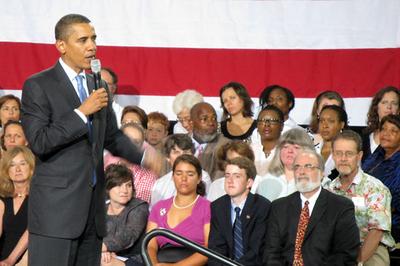Advertisement
A Civil Discourse At Obama Health Care Forum
ResumeNew Hampshire seems to have given President Obama an auspicious start to his summer push for his proposal to expand health insurance coverage. In Portsmouth on Tuesday, no hecklers turned out to drown out the president as he sought to regain the momentum in the debate over health insurance. The protests remained outside.
At first, it looked like this might be like all those town meetings that members of Congress have been holding all over the country: a lot of shouting, not much discourse. Lining the drive to Portsmouth High School, pro- and anti-Obama protesters yelled at each other across the drive.
Leading into the high school was a long line, hundreds of people long, waiting quietly to get in. Some showed up to wait in the high humidity and sunshine as early as 8 a.m. for the president's 1 p.m. appearance.
They came from all over New Hampshire, and Massachusetts and Maine, as well.
Jackie Millet left her home in Welles, Maine, at 7:30 a.m. She was worried that if her husband dies, she'll lose his private supplemental health insurance, and will be left with Medicare.
"Medicare helps cover most of what I need done," she said. "The supplemental helps to pay for my meds, and those are very expensive. I have narcolepsy, where I tend to fall asleep, so I need it to stay awake and without it I can't function. I couldn't be able to drive."
Inside, nobody shouted anybody down. People asked their questions. They got answers from the president.
Millet got to ask her question. "I take a lot of medications. I've had a lot of procedures," Millet told the president. "How will Medicare, under the new proposal, help people who are going to need things like this?"

"In terms of savings for you, as a Medicare recipient, the biggest one is on prescription drugs," President Obama replied, "because the prescription drug companies have already said that they would be willing to put up $80 billion in rebates for prescription drugs as part of a health care reform package."
Millet would still have to pay out of pocket for her drugs, but, the president argued, it would be less than she's paying now.
It was an answer that satisfied Millet. "I thought he was very direct, she said. "He made me feel a lot better about what was going to happen."
President Obama also took questions from critics of his plan, including Ben Hersenshon, from Ogunquit, Maine.
"I'm a Republican," Hershenson told the president. "I don't know what I'm doing here, but I'm here. "
"We're happy to have you here," the President replied.
"I'm on Medicare," Hershenson said, "but I still worry that if we go to a public option, period, that the private companies, the insurance companies, rather than compete — 'cause who can compete with the government? The answer is nobody — so my question is do you still yourself, now, support a universal plan, or are you open to the private industry still being maintained?"
"There is nothing inevitable about this somehow destroying the private marketplace, and this is a legitimate point that you are raising," the president said. "That it's not set up where basically the government is being subsidized by the taxpayers so that even if they're not providing a good deal, we keep having to pony out more and more money, and I've already said that can't be the way the public option is set up. It has to be self-sustaining."
"Does that answer your question?" the president added. "OK."
But Hershenson didn't think the president did answer the question.
"Not at all," he said. "Partially, sure he did, but I honestly feel insurance companies will be forced out if the government has a single-payer plan. I really believe that."
The president took questions from several people skeptical of his proposals, including Justin Higgins, of Stratham, N.H., a recent graduate of St. Paul's School in Concord, N.H.
"There's a lot of misinformation about how we're going to pay for this health care plan," Higgins told the president, "and I'm wondering how we're going to do this without raising the taxes on the middle class, because I don't want the burden to fall on my parents."
"My belief is that it should not burden people who make $250,000 a year or less," the president replied, "and I think that's the commitment that I made, the pledge that I made when I was running in New Hampshire, folks. So I don't want anybody to think that I'm pulling a bait-and-switch here. I said very specifically that I wanted to roll back the Bush tax cuts to pay for health insurance. That's what I'm intending to do."
Higgins, who will be a freshman at Tufts University this fall, later said he heard some wiggle room in that answer.
"I don't feel that he definitively said he would not raises taxes on the middle class," Higgins said. "I thought he had referenced it when he answered my question saying he had made a pledge in New Hampshire and he's going to stick to that pledge, but he didn't definitively say 'no new taxes for the middle class,' as President George Bush did when he was running for president."
The give-and-take between the president and New Englanders at the forum in Portsmouth seemed to have nothing in common with the shout fests reported in other parts of the country. In a debate that has been anything but civil since Congress went home two weeks ago, Yankee civility won out.
